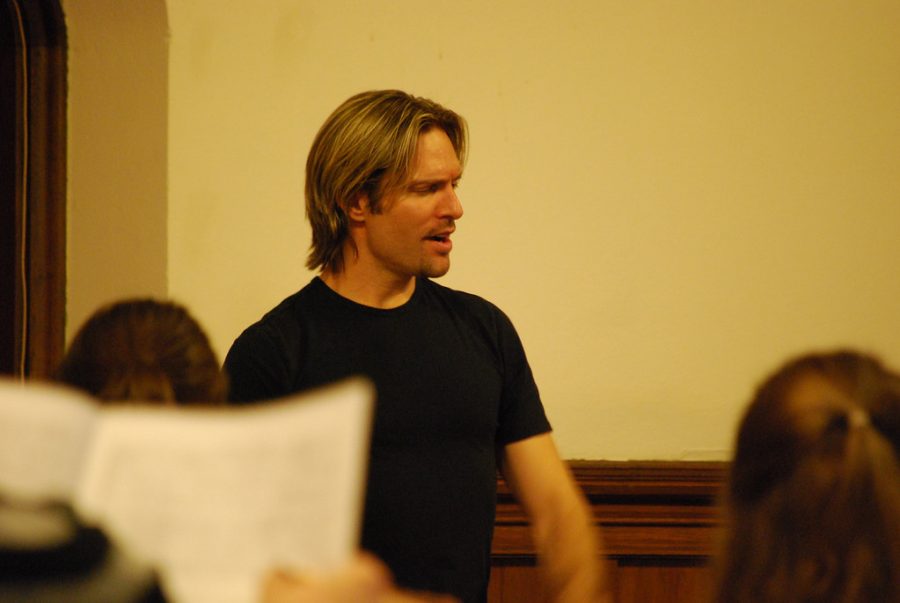The Sacred Veil– The Mesmerizing Meaning Behind the Music
Photo by VocalEssence Ensemble Singers
Composer Eric Whitacre and poet Charles Silvestri teamed up to create one of the most beautiful choral works in modern classical music. It takes on subjects like love, sickness, grief, and death.
Music and words have an infinite amount of power. A well-placed word or chord can completely change the dynamic of a poem, a piece, a symphony, or even a day. Behind the hand of a master, either can achieve anything.
So what happens when a master poet and a master composer work together?
I encourage everyone, regardless of musical likes and background to read on, because the message and words of this album are so, so important.
While writing Megan Olson’s Eric Whitacre story, I was inspired to listen to some of Whitacre’s music and happily stumbled upon his newest piece: The Sacred Veil, a collaboration with the poet Charles Anthony Silvestri. Needless to say, I made the marvelous mistake of listening, and I strongly encourage you to as well.
https://www.youtube.com/watch?v=IZz04WQPcf0&list=OLAK5uy_k-FSrcD6Jf5jSBIizn8t3mQwB90V7ANIM
Upon my first listen, the haunting melodies of the first piece, “The Veil Opens”, were nothing more than sheer beauty. However, when I read more about the piece, I was… utterly floored, for this album was not merely a choral album. It was the story of Charles, the poet, and his wife, Julie, who was taken by ovarian cancer. Suddenly, the melodies were three-dimensional, as every word and pitch told the tragic and heartbreaking story of his wife’s death.
The album begins with a simple melody on a single piano, with the cello and voices slowly trickling in. The poem describes a veil, separating life from death, and the mix between minor and major sounding chords adds to the mystery and the beauty of the veil. It seems as though the veil is something we can never understand, as the trademark sound of Whitacre’s pieces somewhat, and in my opinion, intentionally clouds the image of the veil with dissonance and a thick choral sound.
“I had a long time to think and to grieve, and not to grieve… but this first movement of the piece represents a kind of, 35,000-foot view of everything that I have learned about this grief process and about life and death,” Silvestri said in an interview with Apple Music.
The story begins with a love story, which describes when Silvestri first met his late wife. The poem reads, “He would often wonder, who could love a dreamer such as you? And so he trusted no one’s shadow but his own.”
However, in a shocking literary and musical twist, the poem states, “Then quite to his surprise, passing there before his eyes a girl, unlikely, laughing by the shore. She had unlocked his heart and let his spirit soar.” It describes a beautiful and tender scene of genuine and burning love. In terms of musical appeal, it is similar to Whitacre’s, “A Boy and a Girl”, which describes a similar scene of love and tenderness.
As the song continues, the simple piano from the beginning returns, playing a beautiful melody, with the beautiful singing of the choir performing a haunting melody. The words are simple: “You feel like home.”
However, only a few songs later, one of the most heart-wrenching choral pieces I have ever heard began to play. What once was sweet and beautiful turns extremely sour as the story takes a sickening turn. I have never heard a piece such as this, especially because the words are as follows:
“I’m afraid we found something… Fifteen centimeter retroperitoneal cystic mass with complex internal separation. The patient is a twenty-eight-year-old female, primigravida, in the third trimester of pregnancy… pathology confirms grades 1, 2, and 3 mucinous cystic adenocarcinoma with focal carcinosarcoma consistent with ovarian primary…”
Yes, those are the actual lyrics to the piece. It is extremely difficult to listen to, in the best way possible, both with the words and the music itself. There is no fluff, no emotion expressed in the words. It is the literal diagnosis. All of the emotion is carried through the masterful composing of Whitacre, who, with every methodically placed dissonant chord, squeezed the breath from my lungs in fear.
I was taken aback. The story has reached its climax. But it isn’t over yet.
Following the emotional assault in “I’m Afraid”, the listener can take solace in a musical interlude titled, “I am Here”. This piece contains beautiful tritones (I bet you would never hear me say that, Mrs. Cassel) in the piano part, accompanied by a beautiful cello part. I feel like this can communicate the immense emotional struggle it would have been to support a loved one through this, as the two instruments interact in a difficult and unique way.
The dramatic irony is bleeding. The listener knows that she is going to die.
“My hair started to fall out at precisely 1:00 on my birthday.”
This was the start of the next movement of the piece. However, there is something different: the words were written by Julie Silvestri. The dead speak to the listener in the most intimate way possible– through what was likely a journal entry.
This piece made me want to cry, but I was too enraptured in the story and music to do so. The song describes her daughter and son helping her shave off her hair, and how her daughter, instead of being scared, accepted her mother and adored her wig. When she went to visit her son in his kindergarten class, he bragged about his mother having a wig. You see the world through the eyes of a terminally ill woman looking at her young kids and her family. The song was called “Delicious Moments.”
The next song describes a scene where the poet needs to save his wife from drowning, which was probably a metaphor for the cancer ravaging her body. The dream takes place on a beach, which was where they first met. The song seamlessly transitions into a letter, possibly even a Facebook post, where we get the final updates on Julie’s health condition– again, in her own words.
“My doctor said this meant I most likely had about two months to live. I am asking you to pray as you have never prayed before. Please don’t pray that I will have a peaceful death, please don’t feel pity for me. Just pray for me.”
It is a cry for help, a desperate plea after everything else has failed. She does not want to have a peaceful death. She wants to be fully healed. The musicality in this piece bleeds with emotion and agony, as everyone now knows where it is turning.
There are no words for the penultimate (second to last) piece. It begins with what can only be described as choral sobbing, where each part slides across one another to represent the labored breathing of Julie. The listener has arrived at the dreaded moment: we are at her deathbed.
“Listening to your labored breath, your struggle ends as mine begins. You rise, I fall. Fading, yet already gone.”
All at once, the emotions attack. However, in the middle of the song, I found the emotion uncontrollable. It filled every emotional hold I have in my body with uncontrollable sadness. I have never listened to something that was so painful on the ears and heart, and yet, I couldn’t press pause. I couldn’t cry. I was too invested in the characters, their pain, and their struggle.
3:56 was when it hit. When the song hit that point, that represented Julie leaving this world, crossing the Sacred Veil. Each “you rise” rising with intensity and pain, every you fall descending into madness and grief. The voices of the choir act as one entity, flawlessly crossing and sliding into new, dissonant pitches.
“Broken, with a heavy hand, I reach to you and close your eyes. You rise, I fall. I fall.”
The final song is easier on the ears and heart with a call to Julie. “Child of wonder, child of sky, time to end your voyage. Time to die.” The song ends with “welcome home”. The story is over.
So what happens when a masterful poet and a composer work together?
They change the world.




